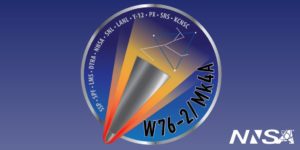Senate Democrats — led by a member of the Senate Armed Services Committee (SASC) and Democratic presidential candidate — are calling on committee leaders to adopt several House-passed measures that would ban low-yield missiles deployment and extend the new START Treaty during future conference sessions over the fiscal year 2020 National Defense Authorization Act (NDAA).
Sen. Elizabeth Warren (D-Mass.) sent a letter Aug. 20 to SASC Chair Jim Inhofe (R-Okla.) and Ranking Member Jack Reed (D-R.I.) requesting that they include three nuclear weapons-related provisions in the final NDAA that were passed in the House version, but not the Senate.

Co-signed by 17 fellow Democratic senators, the letter calls for banning the deployment of the W76-2 low-yield nuclear warhead, calling on the White House to extend the New Strategic Arms Reduction Treaty (New START), and denying funding for specific intermediate-range nuclear missiles following the dissolution of the Intermediate-Range Nuclear Forces (INF) Treaty earlier this month.
The W76-2 warhead is a “dangerous, costly, unnecessarily and redundant addition to the U.S. nuclear arsenal,” the senators said in the letter. “The sea-based leg of our nuclear triad is our most survivable deterrence asset. … By putting a ‘tactical’ nuclear weapon on a Trident missile, we will be putting our most valuable strategic asset at risk.”
The new weapon would also reduce the threshold for nuclear use, the letter said. Supporters of the W76-2 have argued that it provides a more credible deterrence against an adversary’s weapon of similar yield. The letter said: “Russia would not know whether the incoming missile would have a low-yield or a high-yield weapons. They would likely have to assume the worst and respond with equal or greater force.”
The letter’s authors requested that SASC leaders keep House NDAA language that rejects funding for new INF-style missiles “until pragmatic diplomatic and strategic planning steps are taken” to prevent an arms race in the European or Indo-Pacific theaters.
They also called for the extension of the New START Treaty for an additional five years, from February 2021 to February 2026, noting that the sole arms accord left standing provides the U.S. government with “valuable insight” into Russia’s nuclear arsenal and an extension would allow the Trump administration time to negotiate a better follow-on deal.
“Negotiating further strategic arms control treaties without such a stable foundation will be considerably more difficult,” the letter said.
Signatories include fellow SASC members Sens. Kirsten Gillibrand (D-N.Y.) and Mazie Hirono (D-Hawaii), as well as Democratic Sens. Dick Durbin (Ill.); Ed Markey (Mass.); Chris Van Hollen (Md.); Jeff Merkley (Ore.); Bernie Sanders (Vt.); Dianne Feinstein (Calif.); Kamala Harris (Calif.); Ben Cardin (Md.); Tammy Baldwin (Wis.); Brian Schatz (Hawaii); Ron Wyden (Ore.); Sherrod Brown (Ohio); Patty Murray (Wash.); Cory Booker (N.J.); and Amy Klobuchar (Minn.).
The nuclear issues laid out in the Senate Democrats’ letter will likely be some of the toughest ones to consolidate in the conference NDAA talks. SASC Republicans, including SASC Strategic Forces Subcommittee Chair Deb Fischer (R-Neb.), have vocally supported the W76-2 weapon development and senators in the majority are unlikely to counter President Trump’s talking points related to the INF and New START (Defense Daily, July 30). Meanwhile, the House Armed Services Committee (HASC)’s version of the NDAA, led by Chair Adam Smith (D-Wash.), banned the development of the new warhead.